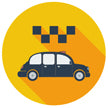We all love to travel! Exploring places and cultures, meeting new people and stepping out of our comfort zones are just a part of what can create unforgettable lifetime memories. But, travelling can also become an absolute nightmare when things go wrong. I’ve taken the liberty to list my top ten tips for travelling overseas. I think there’s a fine line that separates ‘tourists’ from ‘travellers’. These tips will help define which one you are.
Tip 1.

Booking flights: to search for your best flight options try using meta-search websites such as www.skyscanner.com, www.kayak.com.au and www.google.com/flights. These websites scan fares on offer from multiple airlines and travel booking websites and re-direct you to a site where you can book the flights you choose. Once you have selected and booked your flights, if you’re not a ‘in a rush’ kind of person, avoid doing online check-ins as many airlines sell last minute upgrades at their check-in counters.
Tip 2.

Booking accommodation: Before booking accommodation or activities, have a look at ‘traveller review’ websites. The most popular one is www.tripadvisor.com where you will find extensive reviews from travellers that are accurate in most cases. For booking accommodation, websites like www.booking.com are handy since you can cancel most of the bookings without any cost, even on the day of check in. Other popular options include www.agoda.com and www.airbnb.com.
Tip 3.

Passports and important documents: It’s a good habit to scan your passport along with other important documents and upload them to icloud or an alternative secure online location. Just in case documents get lost or stolen, I prefer to keep a digital copy in www.dropbox.com so I have easy access from any computer with an internet connection. If you are not a person who likes the idea of using a secure online location you can also send a copy to your personal email address. Also remember, you should never travel with a passport that has less than six months until the expiry date.
Tip 4.

Visa: It’s a pretty obvious thing, but don’t forget to check in advance if you need a visa for entering into the country you’re planning to visit. The paperwork can often be exhausting for specific visas so plan well in advance. If paperwork and bureaucracy is not for you there are agents that can resolve all the paperwork for you at reasonable prices. Check www.visalink.com.au for more details.
Tip 5.
Health: before travelling overseas you should book an appointment with a travel doctor to make sure your vaccinations are up to date. Some remote travel locations can be pretty isolated and the closest doctor can be many hours away so it pays to be prepared. Your travel doctor will also provide you with proper information regarding the best first aid kit to suit your travel activities. You will find all the information you need at websites such as www.smartraveller.gov.au, www.ravelvax.com.au or www.traveldoctor.com.au.
Tip 6.
Travel Insurance: booking travel insurance is essential, especially if you’re traveling to an undeveloped country. Believe me, you don’t want to see yourself waiting in a hospital without being attended to because you don’t have travel insurance or cash. In many countries you can’t see a doctor until you pay in advance, even if it’s an emergency. There are a number of competitive options available online and be sure to check what you’re actually insured for.
Tip 7.

Finances: You can travel with cash and have it exchanged into local currency in some banks or exchange offices but my recommendation is to travel with a credit card for most transactions and withdraw necessary funds from a local ATM machine. Avoid small withdrawals as the ATM fee is the same for small or large withdrawals. A credit card can easily be cancelled if lost or stolen and the commissions are pretty much the same as exchanging money on the average exchange rate. Some good tips regarding credit cards are to travel with more than one, preferably from different banks and keep the two cards separate from each other whilst travelling. Keep a minimal amount of money in the accounts linked to your cards and make a call to your bank informing them of your travel dates in advance. Some banks block their cards if they are used in a different country without prior notification. Always check your cards expiry date before you start travelling.
Tip 8.

Luggage: Pack light, because it’s a fact that you won’t use half of the things you initially plan to take with you. Try to keep your luggage easily manageable by yourself as you can often find yourself in situations where you need to move fast and efficiently. Key items include suitable footwear for specific terrains, a hat, sunscreen, torch and always take a light rain jacket. Check the weather forecast for your destination and the time of year you are travelling and pack accordingly. If you have check-in luggage it’s a good idea to take a photo of your luggage and check-in tag with your camera or phone for easy identification if your luggage goes missing.
Tip 9.

Moving around: When I arrive to a new destination I like to book at least the first night in advance. I usually research online the best transport options to arrive at my accommodation whether it be by taxi, bus or train. If public transport is not available from an airport and you need to get a taxi, it’s usually best to get a pre-paid or fixed rate taxi from the airport to your accommodation. Always ask and confirm the price before you accept the ride. As a tourist you will almost always pay a higher rate but don’t let a couple of dollars ruin your day. Try to get a fair price but don’t get caught up in an unnecesary negotiation.
Tip 10.

Stay in tune with your new environment. Some local behaviour’s can cause cultural shocks so always keep an open mind and try to avoid making bad judgements. Every culture has their ways and it wont be the same as yours. Observe, respect and learn the culture, it will make for a more rewarding travel experience. Also when you travel to undeveloped countries you should be aware about your behaviour having a negative influence on their culture. Some people, especially young locals, may try to imitate you so be aware of your actions and show your best side at all times, even if you’re tired and sometimes frustrated after an exhausting day in transit. A smile can go a long way in any country.
Happy travels!!

Leave a comment: